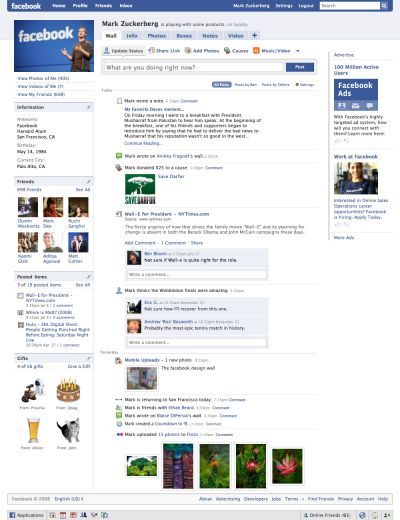Facebook patents social networking update feeds

Facebook has won a US patent on news feeds behind the kinds of real-time updates that make social-networking websites a hit with users.
"The launch of News Feed in 2006 was a pivotal moment in Facebook's history and changed the way millions of people consumed and discovered information on the site," Facebook said Friday in an email response to an AFP inquiry.
"We're humbled by the growth and adoption of News Feed over time and pleased with being awarded the patent."
Facebook declined further comment, suggesting AFP contact a lawyer for perspective on the significance of the patent.
The patent summarizes the "invention" as "a method for displaying a news feed in a social network environment."
The method was described in US Patent and Trade Office paperwork as including comments and links posted by social network users for sharing with other members of the online community.
That broad concept strikes at the core of Twitter, which lets people share thoughts or observations at any moment of the day using text messages of 140 characters or less.
Twitter analytics team member Kevin Weil said on Monday that users of the service are creating 50 million of messages per day.
Word of the patent awarded to Facebook co-founder Mark Zuckerberg "et al" this week sparked concern among fans of microblogging service Twitter and other social networking services that thrive on real-time News Feed style updates.
"This is stupid!!!" Twitter user A_Kim83 commented in a growing mountain of tweets on the topic Friday. "Screw you Facebook if you start strong arming other sites."
The patent gives Facebook a potential weapon to fend off competitors on an Internet battlefield where social networking is a hot trend, according to analyst Rob Enderle of Enderle Group in Silicon Valley.
"It is not just Facebook taking on Twitter," Enderle said. "It is taking on MySpace or any other social networking service. You might even argue it is a defensive move against Google."
Early this month the Internet search powerhouse added a Buzz social networking feature to its widely-used free email service Gmail.
Google Buzz allows Gmail users to get updates about what friends are doing online and offers ways to share video, photos and other digitized snippets in a challenge to social networking stars Facebook and Twitter.
While Buzz was bashed for treading on people's privacy by automatically generating social networks for users based on their Gmail contacts, the feature is being honed and may be seen as a threat by Facebook.
"Buzz is a train wreck, but it was enough to scare a bunch of these guys half to death because it showed Google getting into their space," Enderle said.
"Facebook is probably more concerned about Google than Twitter and MySpace combined and squared. Any time a 600 pound gorilla enters your room you are pulling out your heavy weapons."
Patent in hand, Facebook is in a position to deny others permission to use its invention or license the technology, according to the analyst.
"It is transformational for Facebook and indicates that they have a big desire to own their customers," Enderle said.
Join our commenting forum
Join thought-provoking conversations, follow other Independent readers and see their replies
Comments
Bookmark popover
Removed from bookmarks